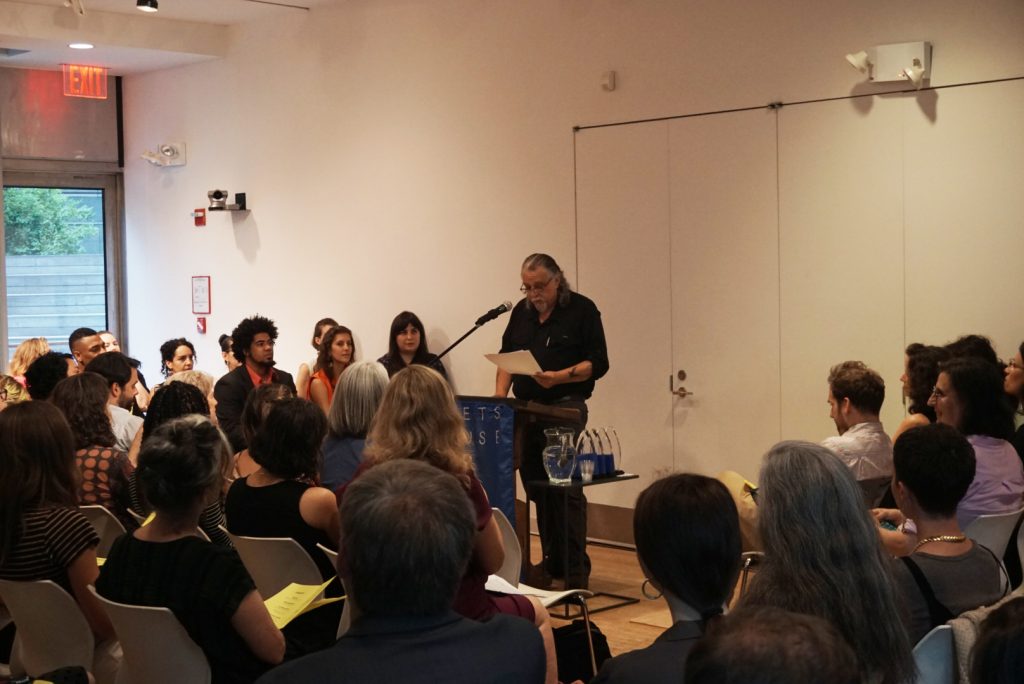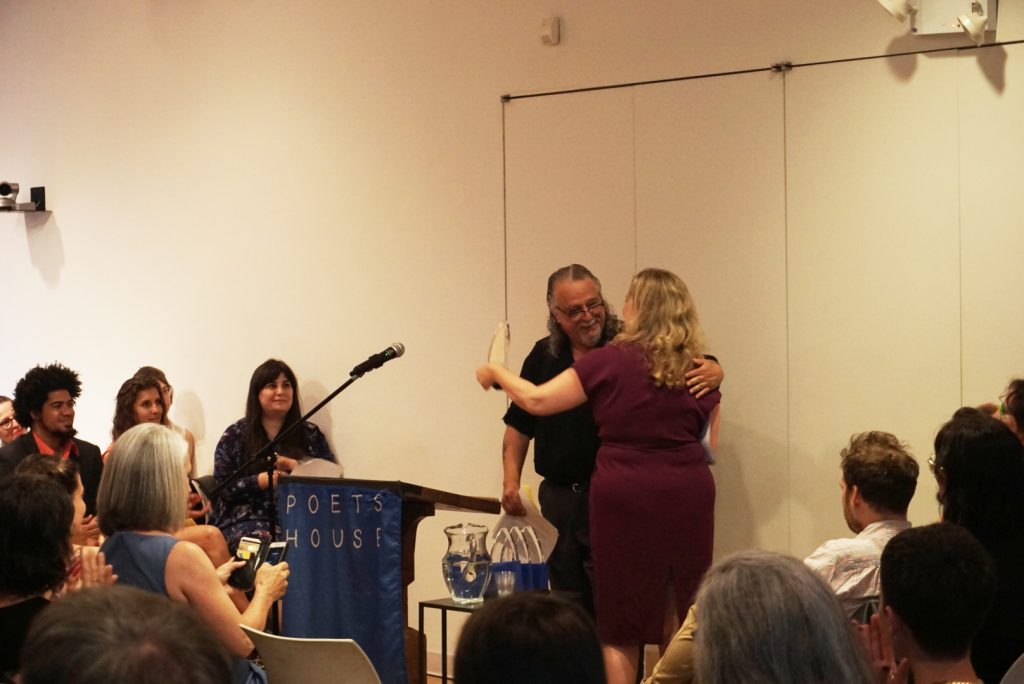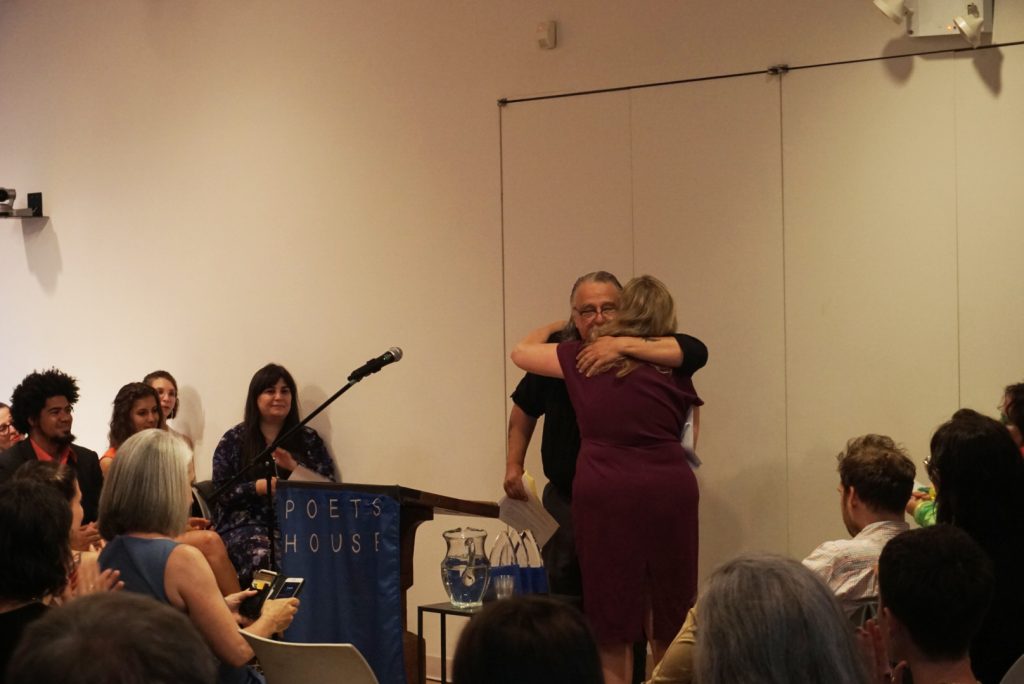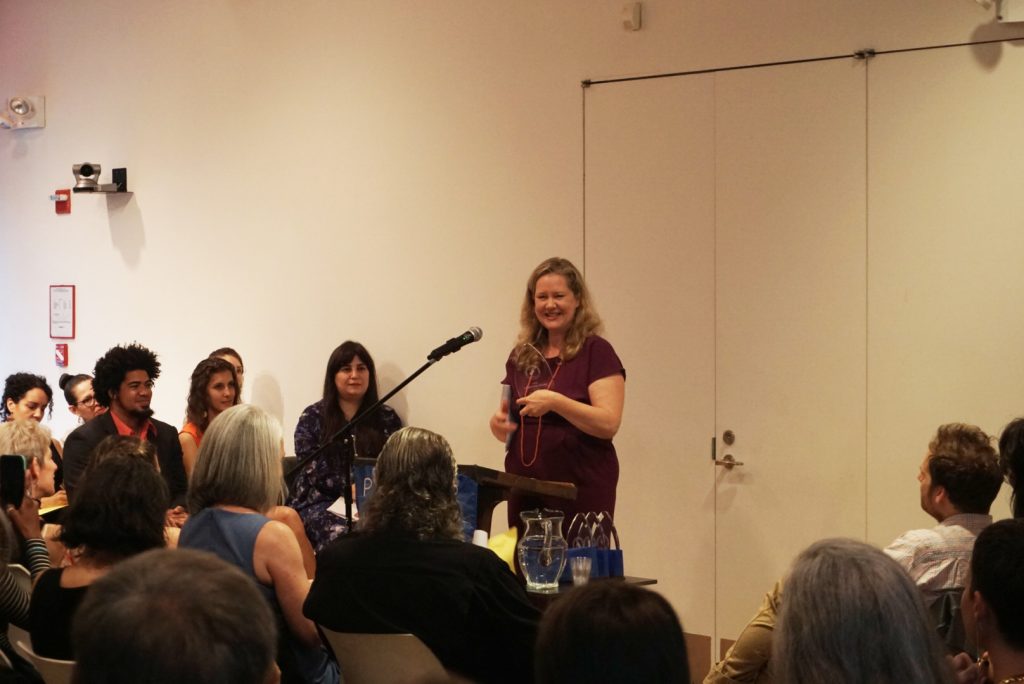On June 5, 2019, CLMP Board Member David Wilk gave the following remarks as he presented the third annual Lord Nose Award to poet Lee Ann Brown of Tender Buttons at the 2019 Firecracker Awards ceremony held at Poets House in New York City.
It is my great pleasure and honor to present the annual Lord Nose Award to commemorate and honor the work of Jonathan Williams, Lord Nose himself. This award is given to celebrate an independent literary press in recognition of a lifetime of publishing.
Jonathan Williams was founder and publisher of the Jargon Society. He was a poet, essayist, photographer, raconteur, and cultural observer with a mordant wit and a clear eye for artistic excellence wherever it might be found.
Over more than half a century, beginning in 1951 at Black Mountain College, Jargon published 85 books and 30 broadsides and ephemera, all expressing Jonathan’s unique vision and his effort to search out and publish work that truly mattered, that needed to be nurtured and brought forth into the world. His commitment to making books that were as beautiful as possible never wavered.
The books and broadsides he published include many that are now recognized as seminal, and many Jargon titles are now well known, but then obscure writers’ first books. The Jargon list is an active representation of many of the most important creative figures of the late twentieth century.
Jargon books represent Jonathan’s lifelong dedication to words and art, to discovery and joy, the social act of making public the work he championed.
This award is in part a humble thank you and acknowledgment of what he meant to me and so many others, as friend, poet, and publisher. I would like to thank Jeffery Beam and Stanley Finch, for their important contributions to this effort, Tom Meyer, Jonathan’s life partner, for his endorsement of this award, also Jeffrey Lependorf, Mary Gannon, and everyone at CLMP for giving this project a home, and Poets House for giving us this great location.
It is my great honor and privilege today, to award the third annual Lord Nose award to Tender Buttons Press and its founder and editrix Lee Ann Brown.
Lee Ann, like Jonathan Williams, is both a poet and a publisher. Lee Ann has eyes and ears for talent and unusual voices, demonstrating an intransigent belief that all too often, our best art is either invisible to or ignored by the traditional keepers of culture. Like Jonathan, Lee Ann’s work as poet and publisher are inextricably linked.
Jonathan Williams wished to identify and recognize the beautiful, sometimes weird moments in life that make it so worth living and enjoying. Similarly, Lee Ann has spent some 30 years finding and nurturing the voices of writers, specifically women writers, in whom she sees that ineffable specialness that makes great art possible and through her work as publisher, is made available to readers all over the world.
Poetry presses are ephemeral. Much like poets themselves, they take form and substance through dedication and effort that often is transformative, yet sometimes “life” gets in the way of art, sometimes, the moment passes, sometimes, the energy wanes.
There are literally hundreds, perhaps thousands of poetry presses that produced a few great books, or even quite a few great books, and then either disappeared in a puff of smoke or simply ran their course and closed up shop.
Poetry presses tend to express a moment in time, like writers, finding their voices, and then when the moment has passed, the words and pages stop, and the poets and editors who made the presses happen, move on to other moments, other forms of expression. Many, perhaps most poetry presses, are like the Buddha’s breath. They do not need to exist beyond their moment of creation; they can then disappear, leaving behind the books they produce in shapes and sizes that amaze and delight those readers who manage to find them.
But the very few presses that exist out of a powerful need and commitment to express the ongoing love and attention of their founders are truly precious and special.
We want to recognize them and the people who made them, because we know how difficult and challenging it is to create a sustained body of work over a long period of time, perhaps a lifetime. To remain vital and meaningful over a period of years is very difficult indeed, and needs to be acknowledged, a lifetime of making art through struggle is important, and yes, rare.
Tender Buttons exemplifies the tradition of independent publishing that Jonathan Williams embodied. And I know that Jonathan would have joined us in congratulating (fellow North Carolinian) Lee Ann Brown on her own lifetime of publishing so many books that truly matter.
As it happens, Lee Ann founded Tender Buttons in 1989, so we are able to celebrate its thirtieth anniversary today.
As a poet Lee Ann is the author of a number of books, including Other Archer; In the Laurels, Caught, which won the 2012 Fence Modern Poets Series Award; Crowns of Charlotte; The Sleep That Changed Everything; and Polyverse, which won the 1996 New American Poetry Competition, selected by Charles Bernstein.
As a publisher, this is what Lee Ann says about her work:
“Tender Buttons aims to publish the best in experimental women’s writing. The poetics of all Tender Buttons books gives rise to an extraordinary range of innovative forms and modes including conceptual projects, cut-up, the boundary between life and art, documenting consciousness, refrigeration of poetic form, radical intertextuality, the question of generations and generativity and how to write against, out of, and around another’s writing. ‘Write in as many ways as you can imagine,’ Bernadette Mayer said and the parallel projects of my press and my poetry writing ‘attempt to write in a way that’s never been written before.’”
Exactly right. Tender Buttons, like Jargon, expresses publishing as an act parallel to the founder’s writing. So you can read Lee Ann Brown’s writing, and you can read the books she publishes all as part of the same body of work.
That is precisely the meaning and importance of a poet’s press, a press of poets.
What a great group of writers Lee Ann has brought us: Dodie Bellamy, Harryette Mullen, Jennifer Moxley, Anne Waldman, Rosmarie Waldrop, Hannah Weiner, Bernadette Mayer, among others.
I think it is appropriate to read a short passage from Gertrude Stein’s poem, ‘Tender Buttons,’ the poem that inspired Lee Ann, that inspires me today to think about what poetry and publishing mean to us, in a time when they are so much needed by the world.
“The change in that is that red weakens an hour. The change has come. There is no search. But there is, there is that hope and that interpretation and sometime, surely any is unwelcome, sometime there is breath and there will be a sinecure and charming very charming is that clean and cleansing. Certainly glittering is handsome and convincing.
‘There is no gratitude in mercy and in medicine. There can be breakages in Japanese. That is no programme. That is no color chosen. It was chosen yesterday, that showed spitting and perhaps washing and polishing. It certainly showed no obligation and perhaps if borrowing is not natural there is some use in giving.”
Thank you Lee Ann Brown. Congratulations!




